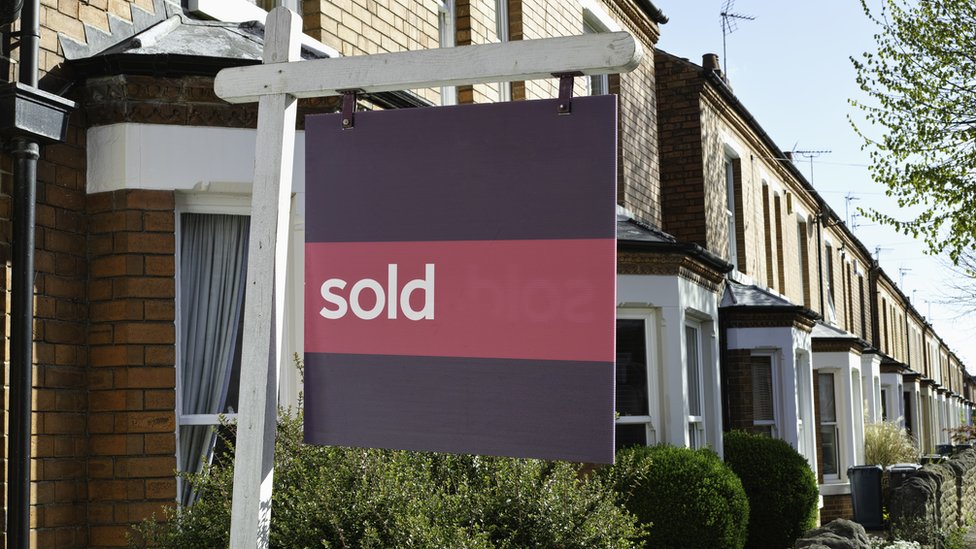Payment holidays: 'I can't afford to be out of work'
By Kevin Peachey
Personal finance correspondent
-
- Published

She was initially furloughed then told there was no more work at her latest job in a garden centre and restaurant.
"I've been at home, climbing the walls. I've been very anxious," said the 45-year-old, from Hampshire. "I can't afford to be out of work."
Her determination to be back in a job meant trying to spend as much time as possible applying for jobs and firing off letters to employers.
But, instead, she had to spend hours on the phone trying to organise a payment deferral, or "holiday" on her Barclaycard credit card repayments.
The payment of £200 a month was her only debt, she said, but it took multiple, frustrating calls to organise a break in repayments while looking for work.
"I was angry with them, but in the last few days they have been very good - freezing the bill and making sure I'm OK," she said.
'Lifeline'
With 85% of UK adults having at least one loan of some type, payment holidays have been a key protection for people whose finances have been hit hard by the coronavirus crisis.
A sudden drop in income while on furlough or after redundancy had an immediate and unexpected impact on their ability to pay the bills.
Some 2.5 million people took a payment break on their mortgage since the start of the pandemic, according to figures from UK Finance, which represents banks and other lenders. Some 162,000 mortgage payment deferrals are still in place now.
At the peak, another two million deferred repayments on credit cards and personal loans. There are 97,300 agreements still in place on credit cards and 64,400 on personal loans.
The City regulator, the Financial Conduct Authority (FCA), said it expected a large number of people to continue to need help.
Its research suggested 12 million people in UK had low financial resilience - meaning they found it hard to pay bills or loan repayments.
Some 31% of those asked in its survey have seen a decrease in income since the outbreak of the pandemic, with households typically seeing income fall by a quarter.
Those from a black and minority ethnic background were more likely to be affected, with 37% taking an income hit.
People aged between 25 and 34 were the most likely, by far, to have had a change in employment as a result of the pandemic.

A payment holiday proved to be a lifeline for Gareth, whose finances would have been "in a pickle" without it. A month before lockdown, he and his fiancee bought their "home for life".
"Our household income went down by 85% overnight and without the mortgage holiday and using our wedding savings, we wouldn't have been able to pay our bills or eat. Things are that tight," he said.
Coronavirus put their plans to get married next year on hold. Now they are also expecting a baby.
"We were able to pay our mortgage after the three-month holiday. Luckily, we're doing okay, we're still employed and still have a home. But our life has changed," he said.
"The house we bought needed work, we didn't have a working bathroom. It's been testing and tiring, but we're managing."
Not everyone has been given the same lifeline as he had.

More than 30% of people asked in a survey by Turn2Us, a charity which supports people in financial hardship, said they did not know about housing payment holidays. A similar proportion said that these deferrals in rent or mortgage payments were not available to them.
For those who were given some breathing space on bills, the status of payment holidays will change from the end of October.
Current breaks - usually three months in length - will continue until their expiry date. Any new payment holidays, agreed from the end of October, could come with more strings attached.
Significantly, deferrals on loan repayments will start to be marked on a borrower's credit file.
This could affect their ability to borrow money in the future - not just for major loans such as a mortgage, but even credit agreements, such as a mobile phone contract.
What help is available?
Lenders and utility companies are stressing that support is still available, while regulators have set rules and guidance to ensure people are treated fairly. They include:
- Mortgages: Firms should contact those still finding it hard to pay and offer support to meet their needs. This may be short-term payment holidays or longer term repayment plans. They must identify those who are vulnerable and help them find independent and free debt advice. Repossession hearings can start again from the start of November, but not for those in lockdown. Regulators say this is a last resort
- Loans and short-term credit: As with mortgages, lenders need to be flexible and ensure they are supporting people who are struggling, as well as identifying those who are vulnerable. Those put on repayment plans must not see their debt grow in an unmanageable way, so interest, fees and charges should be reduced if needed
- Rent: As was the case during lockdown, tenants struggling to pay their rent need to talk to their landlord to come up with repayment plans. However, eviction cases are being heard again in the courts (with some restrictions) and people should not be told to leave over Christmas. Bailiffs should not be entering homes in Tier 2 and 3 areas
- Energy bills: Pre-payment meter users who cannot top up, possibly because they are self-isolating and cannot get to the shops, will be helped. Any gas and electricity customer struggling to pay will be offered a "realistic and sustainable repayment plan". So far, these have been voluntary agreements with suppliers, but will become a regulatory requirement from 15 December
- Insurance: Customers who had payment holidays or who are struggling financially may have their risk reassessed to make a policy cheaper, or be given more time to pay, or have charges reduced or cancelled. However, anyone finding it difficult must contact their insurer, rather than their insurer contacting them
- Car finance: Lenders have been told to offer support, given the situation with coronavirus. Depending on your circumstances, there is the chance of negotiating lower payments or less interest being charged. If there is no realistic possibility of payment, lenders will be able to repossess the car
- Council tax: Councils have a hardship fund designed to reduce payments for those finding it hard to pay.
Citizens Advice is concerned that new stricter restrictions in parts of the UK, including the tiered system in England, will leave people vulnerable.
"If I'm worried about a perfect storm where people already struggling to keep their head above water financially are going to really suffer," said Jamie McGlynn, local service manager at Citizens Advice Manchester.
For Cat Gibson, a payment holiday is allowing her some breathing space, financially and mentally.
"My dad is trying to support me, but his health is vulnerable, so I worry about him," she said.
As with so many other families, their physical and financial health may be a matter of concern for some time to come.
"work" - Google News
October 22, 2020 at 06:55AM
https://ift.tt/34mbuGk
Payment holidays: 'I can't afford to be out of work' - BBC News
"work" - Google News
https://ift.tt/3bUEaYA
Bagikan Berita Ini














0 Response to "Payment holidays: 'I can't afford to be out of work' - BBC News"
Post a Comment